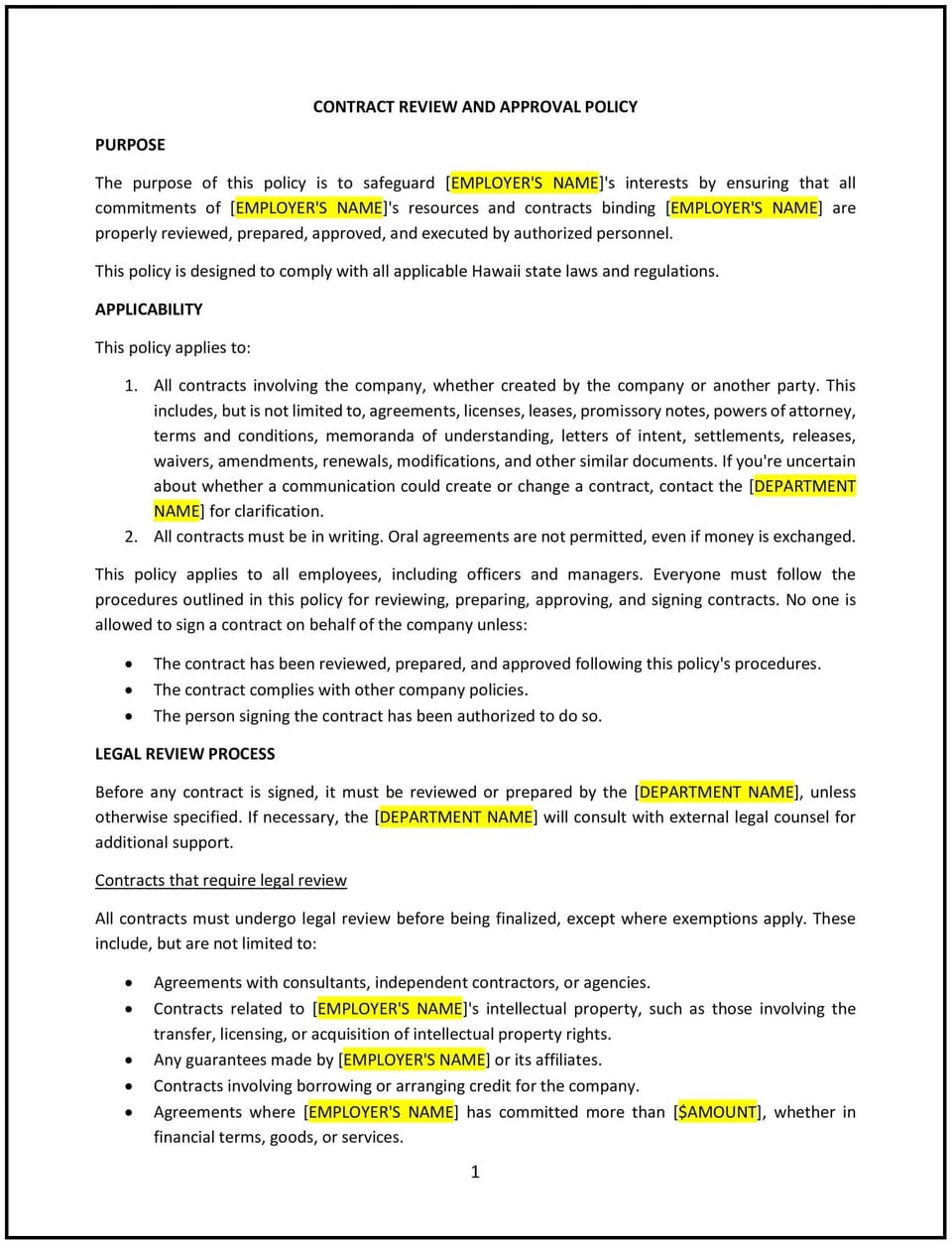Contract review and approval policy (Hawaiʻi): Free template

Contract review and approval policy (Hawaiʻi)
A contract review and approval policy helps Hawaiʻi businesses establish a structured process for evaluating, approving, and managing contracts. This policy outlines the steps for reviewing contract terms, identifying risks, and obtaining necessary approvals, while addressing Hawaiʻi-specific legal and business considerations. It is designed to protect the business’s interests, reduce legal and financial risks, and ensure consistency in contractual agreements.
By implementing this policy, businesses in Hawaiʻi can streamline contract management, improve decision-making, and maintain strong relationships with vendors, clients, and partners.
How to use this contract review and approval policy (Hawaiʻi)
- Define the scope: Specify which contracts are covered by the policy, such as vendor agreements, client contracts, or partnership agreements.
- Establish a review process: Outline the steps for reviewing contracts, including identifying key terms, assessing risks, and verifying compliance with Hawaiʻi laws and business standards.
- Assign responsibilities: Designate roles for contract review and approval, such as legal counsel, department heads, or senior management, based on the contract’s value and complexity.
- Set approval thresholds: Define the levels of authority required to approve contracts, such as dollar amounts or risk levels, and ensure clear escalation paths for high-value or high-risk agreements.
- Use standardized templates: Provide approved contract templates to ensure consistency and reduce the need for extensive revisions.
- Document the process: Require all contracts to be recorded in a centralized system, including details such as parties involved, key terms, and approval signatures.
- Train employees: Educate staff on the policy’s guidelines, including how to initiate, review, and approve contracts.
- Monitor compliance: Regularly audit contract processes to ensure adherence to the policy and identify areas for improvement.
- Communicate the policy: Share the policy with employees during onboarding and through internal communications to ensure awareness and understanding.
- Review and update the policy: Regularly assess the policy’s effectiveness and make adjustments as needed to reflect changes in laws, business needs, or industry standards.
Benefits of using this contract review and approval policy (Hawaiʻi)
This policy offers several advantages for Hawaiʻi businesses:
- Reduces legal and financial risks: A structured review process helps identify and mitigate potential risks in contractual agreements.
- Improves decision-making: Clear approval thresholds and escalation paths ensure contracts are reviewed by the appropriate personnel.
- Ensures consistency: Standardized templates and processes promote uniformity in contract terms and reduce errors.
- Streamlines operations: A centralized system for contract management simplifies tracking, storage, and retrieval of agreements.
- Protects business interests: Thorough reviews help safeguard the business’s rights and obligations in contractual relationships.
- Aligns with legal requirements: The policy helps businesses comply with Hawaiʻi contract laws and industry regulations.
- Enhances accountability: Employees understand their roles and responsibilities in the contract review and approval process.
Tips for using this contract review and approval policy (Hawaiʻi)
- Communicate the policy effectively: Share the policy with employees during onboarding and through regular reminders, such as emails or training sessions.
- Provide training: Educate staff on the policy’s guidelines, including how to initiate, review, and approve contracts.
- Use technology: Implement contract management software to streamline the review, approval, and storage of agreements.
- Monitor compliance: Regularly audit contract processes to ensure adherence to the policy and identify areas for improvement.
- Be transparent: Clearly explain the policy’s purpose, benefits, and expectations to employees to build trust and cooperation.
- Review the policy periodically: Update the policy as needed to reflect changes in laws, business needs, or industry standards.
Q: Why should Hawaiʻi businesses adopt a contract review and approval policy?
A: Businesses should adopt this policy to reduce legal and financial risks, improve decision-making, and ensure consistency in contractual agreements.
Q: What types of contracts should the policy cover?
A: The policy should cover all contracts, including vendor agreements, client contracts, partnership agreements, and other business-related agreements.
Q: How should businesses review contracts?
A: Businesses should establish a review process that includes identifying key terms, assessing risks, and verifying compliance with Hawaiʻi laws and business standards.
Q: Who should be involved in the approval process?
A: Approval responsibilities should be assigned based on the contract’s value and complexity, with roles for legal counsel, department heads, or senior management.
Q: What are approval thresholds?
A: Approval thresholds define the levels of authority required to approve contracts, such as dollar amounts or risk levels, and ensure clear escalation paths for high-value or high-risk agreements.
Q: How can businesses ensure consistency in contracts?
A: Businesses should use standardized templates and provide training to employees to promote uniformity in contract terms and reduce errors.
Q: How often should the policy be reviewed?
A: The policy should be reviewed annually or as needed to reflect changes in laws, business needs, or industry standards.
This article contains general legal information and does not contain legal advice. Cobrief is not a law firm or a substitute for an attorney or law firm. The law is complex and changes often. For legal advice, please ask a lawyer.


